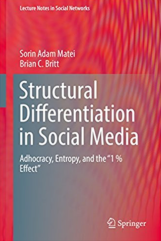If you tell me you haven’t used Wikipedia at least once this year, I’ll suspect you’re lying. For heaven’s sake, a week barely passes in which I don’t use the thing. It’s my go-to source for precursory info on various and sundry topics. Colombia’s climate? Kombucha? Angela Merkel?
I’m no different from millions of other Internet users, likely yourself included. Wikipedia is our casual font of knowledge. When we’re too lazy or time-pressed to do further digging, it serves up answers in neat little bundles. And it’s reliable enough that we trust it for most of our superficial informational needs.
 Yet what exactly occurs behind the scenes of this extraordinarily popular medium? In a recently published book, Structural Differentiation in Social Media: Adhocracy, Entropy and the “1% Effect” by Sorin Adam Matei and Brian C. Britt, the authors explore the community that makes up this medium. In essence, they reveal the wizards behind the curtain, answering the questions of what exactly is going on behind the scenes.
Yet what exactly occurs behind the scenes of this extraordinarily popular medium? In a recently published book, Structural Differentiation in Social Media: Adhocracy, Entropy and the “1% Effect” by Sorin Adam Matei and Brian C. Britt, the authors explore the community that makes up this medium. In essence, they reveal the wizards behind the curtain, answering the questions of what exactly is going on behind the scenes.
If the title doesn’t give it away, this is an academic book. The authors delve deeply into methodology and theory. They get into the nitty gritty of the data collection and theoretical ramifications. Here, I’ve pulled out some of the more interesting insights to shed some light on the underbelly of this great Internet phenomenon.
“If Wikipedia was a country and words its income, the wildly uneven distribution of wealth among its contributor citizens would be unheard of.” (Page 1)
Okay, so Wikipedia is a free online encyclopedia that aims to let anyone edit and add articles. However, a tiny minority of Wikipedia contributors create the vast majority of the content we read. So if we run with the authors’ analogy, 77% of the content of Wikipedia is “owned” by the top 1% of Wikipedians.
Who are these people? They are the elite leaders of Wikipedia. They are the Content Generators Extraordinaire (I came up with his term, I won’t shoulder the poor authors with it – they use the term “functional leaders”). Unlike most formal situations in real life, where leadership is bequeathed to us with some sort of title and fancy compensation package, in this setting leadership is earned. You become a Wikipedian elite because you generate A LOT of content. They’ve earned this (informal) title by doing the labor.
“We are only beginning to understand some of the most basic differences between the elites who dominate social media and those at the top of the income, civic, and other social distribution pyramids.” (Page 3)
Many people expected the Internet to be the great equalizer. It would make everything even. One giant even playing field. But this hasn’t turned out to be the case. As we see with Wikipedia, elite groups with more control and influence emerge nonetheless (just as we see in society). However, the ways in which these groups emerge aren’t the same. Think about it. A leader in our physical lives may get to his or her position because he or she is charismatic and outgoing or maybe even domineering. But online? These don’t translate in the same way (I am vastly oversimplifying, but you get the gist.)
“In the end, social media tend to foster a certain kind of leadership that is defined by the amount of work completed rather than by an official organizational chart.” (Page 6)
Interesting, right?
I’m skipping a lot here (oh, only 150 pages or so), but let’s race to the end. Matei and Britt conclude with:
“The unequal distribution of effort found in social media projects is not a mere accident, but a fact of life. A group of very productive users dominates the collaborative process due to a natural trend toward social differentiation… the metaphorical “1% effect” in the title of this volume makes a direct allusion to this process.” (Page 167)
So why does this matter? And why should we care? I can think of several reasons off the top of my head. For one, the content we read on Wikipedia is likely generated by a smaller group of individuals than we think. Most of the content comes from a core group of “functional leaders,” as Matei and Britt call them. It isn’t the “even playing field” of information generation that many of us may make it out to be. Is that bad? I don’t know. Maybe, maybe not. It is, however, a fact of life, as they authors say.
But more than anything, perhaps it behooves us to know more about the source of so much of our knowledge. As informal as we may consider our Wikipedia searches, it doesn’t change the fact that most of us lean on it regularly. Drawing back the curtain on our Wikipedian Wizards from time to time, as Matei and Britt do, might not be such a bad idea.
Cool!! Thanks!
LikeLike
I don’t think I was surprised about the content creators — mostly because I figured there are a limited number of folks with a mix of enough energy/desire and competence to contribute; and because I figure that’s how most encyclopedias have been created — with fewer contributors and less scrutiny perhaps. I’ll wanna talk more about any concerns you have when I get to see you because I don’t know if I mind that a few contribute the most… but I COULD care if you convince me :o)
LikeLike